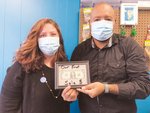



Every year since opening Circle City Books & Music in 2012, Myles Friedman has watched his business expand — that is, until 2020, when the shop’s revenue plummeted by 50%.
“I think businesses like mine are all afraid that we’ll just wither, die and blow away like old tumbleweed without anyone noticing,” Friedman said, noting that Circle City Books was all but shuttered for two months due to COVID-19. “... Like millions of others, my future depends on how quickly we can control the virus.”
Unfortunately, Friedman’s experience is not an anomaly.
As of December, more than 30% of small businesses across the country reported a “large negative impact” from the pandemic, according to a U.S. Census Bureau survey from this month, with another 45% reporting a “moderate negative effect.” Only 6.5% reported any kind of positive growth during the past nine months.
And those are just the businesses that have survived.
According to December data from Yelp, a company which publishes crowd-sourced business reviews, 60% of businesses which closed under pandemic conditions have permanently shut their doors in recent weeks — a 34% increase from mid-summer.
To say that small businesses face tenuous future prospects, then, is an understatement. For many small businesses, this year’s holiday season represents a critical opportunity to make up for some revenue loss over the last several months.
“We’ve been hearing a lot that the holidays are make or break this year,” said Ann Fitts, the communication specialist for Chatham’s Economic Development Corporation.
And not just for Chatham’s small businesses, but by extension, all Chatham residents.
“It’s extremely important because if the businesses go away, we’re going to have empty storefronts,” Fitts said. “That’s going to impact the quality of life here, the quality of a place that people have come to know and love. And that’s just not what we want, that’s not what we need … In every sense, it’s just not good.”
Of course, shopping local is a precarious undertaking. To order from Amazon or Ebay or any online retailer affords more than just convenience — it offers peace of mind in a time when every in-person interaction threatens to spread COVID-19.
“Obviously a lot of people have been staying home, that’s what they’re supposed to be doing,” Fitts said, “and we’re glad they’re doing it. But at the same time, we want them to come out safely and come to our businesses, come downtown.”
Through the holiday season, North Carolina will remain under a modified Phase 3 in Gov. Roy Cooper’s pandemic response protocol. His latest executive order, which will be in place at least until Jan. 8, tightens the statewide mask requirement and creates an effective curfew from 10 p.m. to 5 a.m. Indoor gathering is capped at 10 people. In publicly accessible indoor buildings, the order stipulates no more than 10 people may occupy any single room at one time, making an exception for certain businesses like restaurants and museums.
Such restrictions are designed to stifle spread of COVID-19, but they make retail operation difficult. Still, stores are open for business and eager to serve customers safely.
“Now I think it’s a big challenge to get everyone, if they’re comfortable,” Fitts said, “to realize that they can still come downtown and have a safe shopping experience.”
For some businesses, the cancellations of large events due to the state’s gathering limits has also indirectly hurt sales. Anna Lange, co-owner of Vino Wine Shop in Pittsboro, said the impact has been twofold: the store hasn’t been able to host large wine events to garner new customers and fewer holiday parties could mean fewer wine sales.
Brooke Simmons, the owner of The Chatham Rabbit, said the cancellation of this year’s Siler City Christmas parade hurt her end-of-year sales.
“We have been so blessed in the fact that we have not had to close,” Simmons said, adding that the Chatham Rabbit’s sales are down about 10% this year. “Shopping locally is so important, especially this year. Small businesses rely a lot on the revenues made in December because typically January can tend to be a slow month. It’s so helpful to keep as much money as possible in our town.”
Raleigh Street Gallery owner Christy Eubank echoed that sentiment, saying that while products from Amazon may be more convenient, products sold in Chatham support the people who live there. In her Siler City store — where Eubank has operated for eight years — sales have dropped by 75%.
“I wish more people understood that buying local supports not only my business, but the artisans that have their work here,” she said. “That I have monthly expenses that are set. If I can’t cover those expenses I have no alternative but to close up my store. Do you really want your only alternative to be Walmart in Siler City?”
For new businesses, such as Tienda Hispana El Rayo, which opened less than two months ago, and The Creative Goat, which opened shortly before the first round of closures in March, the pandemic has presented unique challenges.
“You know, starting a brand new business will be difficult but nothing prepares you for something like the pandemic,” said Beth Rhew, who owns The Creative Goat, an arts and crafts shop in Pittsboro. “It’s been hard to grow the business when folks are staying home more and ordering online.”
Tienda Hispana El Rayo owner Tanya García said she and her husband, Jimmy, have been busy preparing for the holidays, stocking up pottery, piñatas, pan dulce (sweet bread) and other traditional Mexican wares in anticipation of shipping delays and supply shortages that typically impact small businesses more than chain stores.
“We just want our friends and customers to know that we’ve done our best to make sure we have all their favorites in stock and truly appreciate all their support,” García said. “We are feeling very hopeful about our future here.”
In addition to the sentimentality that comes with shopping local, Fitts emphasized the contribution it makes to local economies. Money spent in the community benefits the community — out of every dollar spent at a small business in the U.S., 67 cents stays local, according to a 2018 report by American Express.
“Money spent at small businesses in Chatham stays in Chatham longer,” said Lyle Estill, the owner of Fair Game Beverage Company in Pittsboro. “The recirculation of local dollars is a marker of our combined economic health. Local businesses spend their money here. We hire people here. We buy ingredients here. We buy our services here. Money spent at local businesses enriches us all.”
But the benefits local businesses extend to their communities are measured not just in dollars and cents.
“It’s important to remember how much local businesses do to support the larger community,” said Samantha Birchard, the owner of Pittsboro Toys. “We are constantly donating items for local fundraisers and non-profits, and our sales tax goes directly to Chatham County. This may go unseen to most people, but it does a lot to keep our county vibrant.”
Small businesses are also more likely to put effort into a personal touch with customers — not only out of necessity, but because the people shopping with them are often their neighbors and friends.
“We decided we were going to have to be creative if the business was going to continue,” said Tiana Thurber, an owner of Reclamation Home Furnishings in Pittsboro. “Running a small business is a labor of love. There are always challenges. COVID has been a big one, but by no means the only one. We love what we do and we love our community. Hopefully that is evident when customers come into the shop.”
There are many ways in which small businesses benefit local communities and economies. Ultimately, though, they represent livelihoods — hardworking people who have suffered under circumstances no one ever expected to endure.
“Of course, it’s important to me because otherwise I go bankrupt,” said Friedman, the bookstore owner. “That might be important to some people in Pittsboro … But none of that is as important as everyone staying safe and protecting their health … I just hope that if I survive, and when it’s safe again, shoppers will come back.”
Reporter D. Lars Dolder can be reached at dldolder@chathamnr.com and on Twitter @dldolder. Reporter Hannah McClellan can be reached at hannah@chathamnr.com.